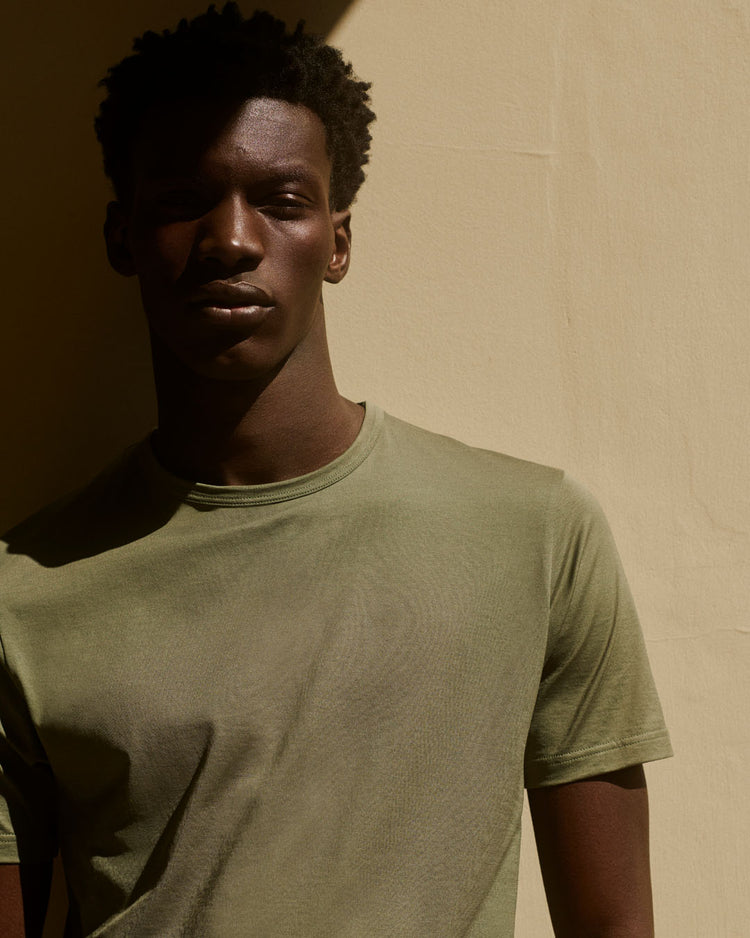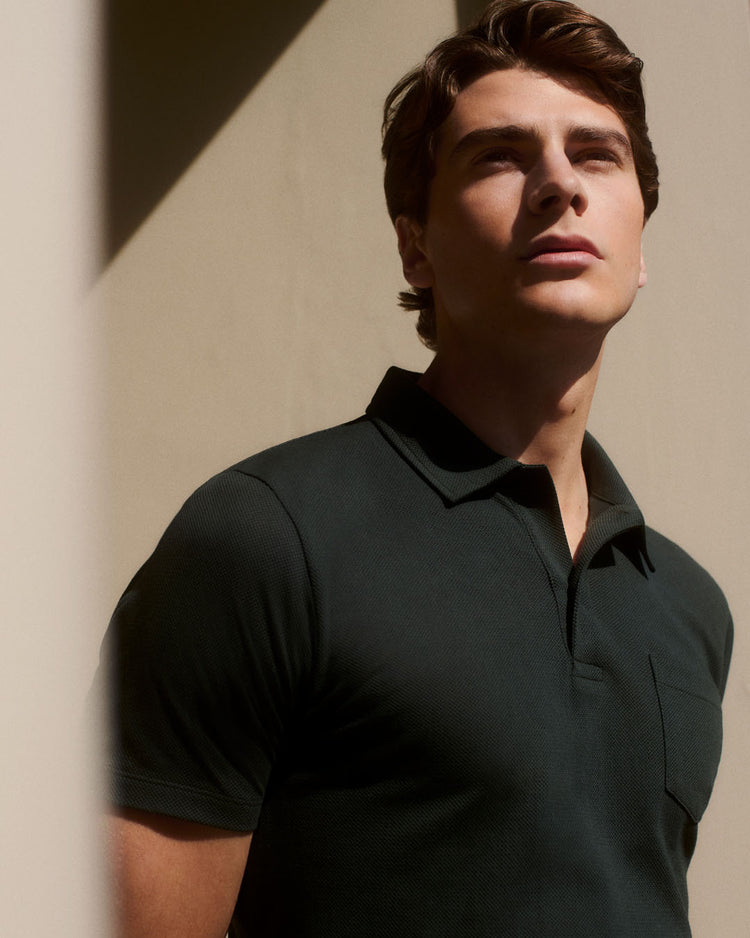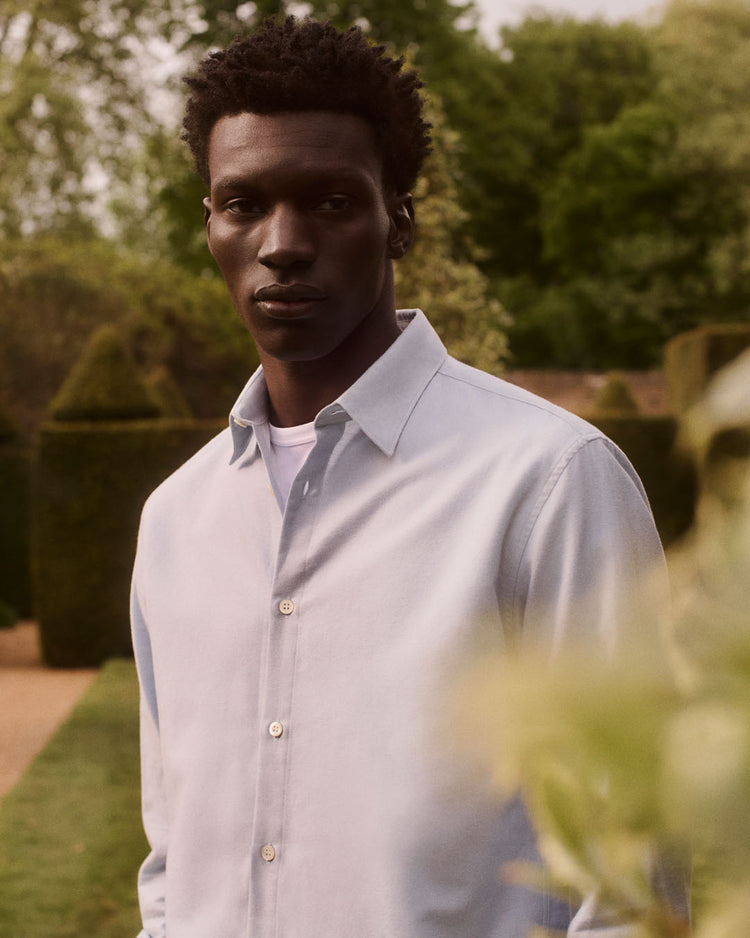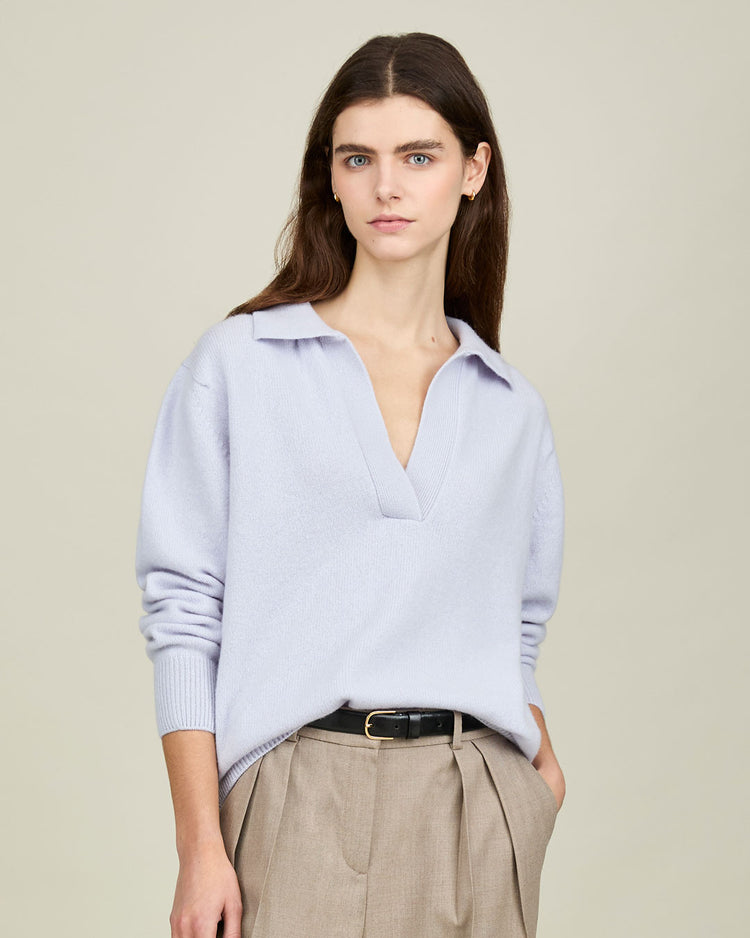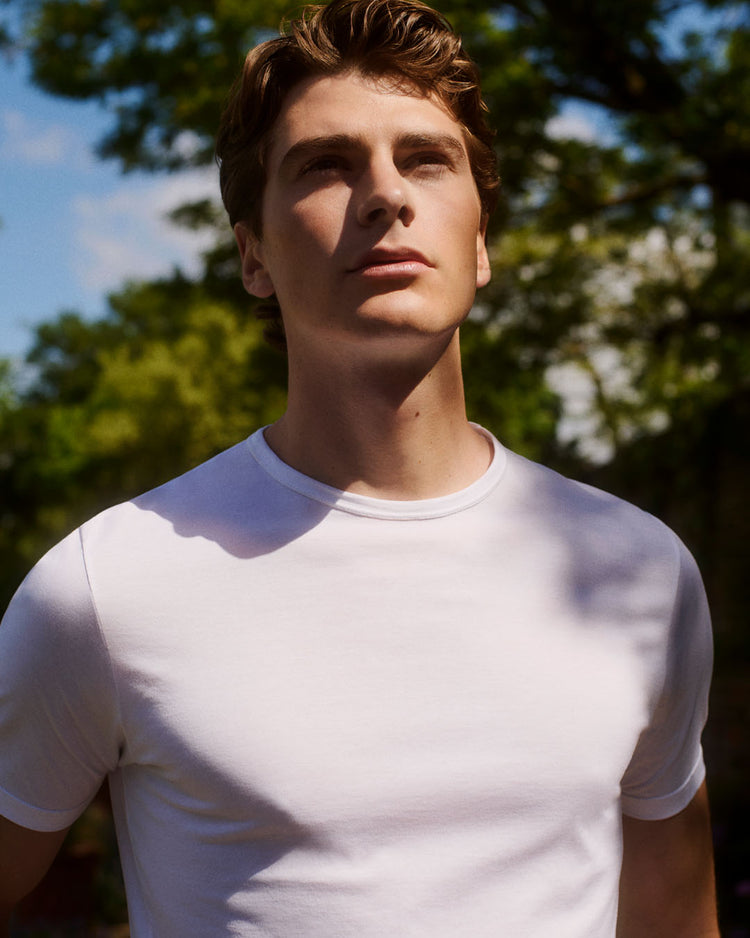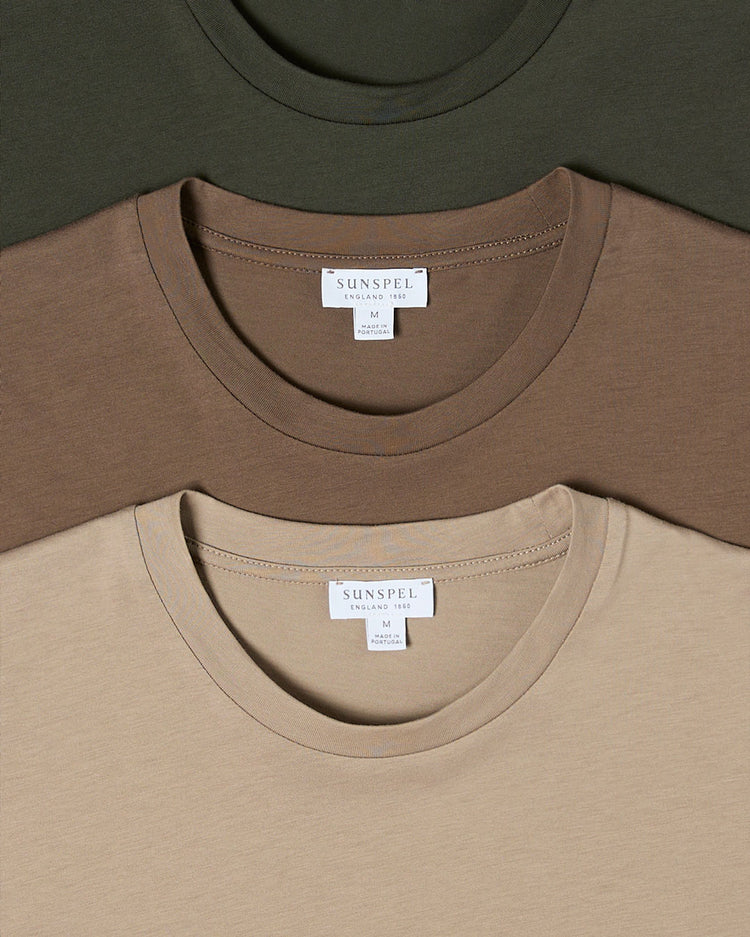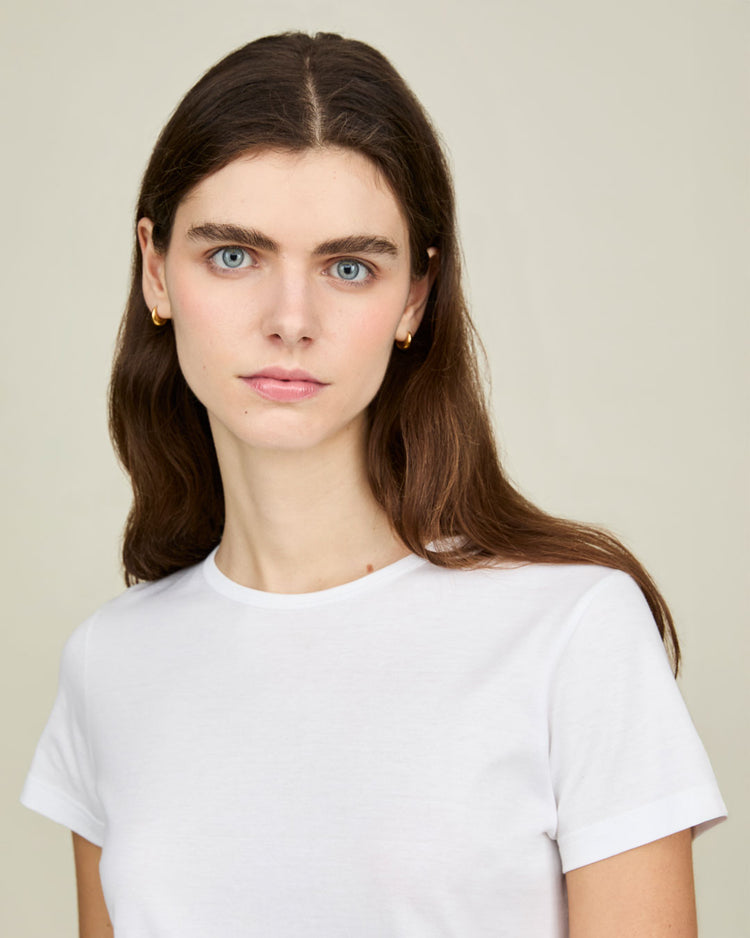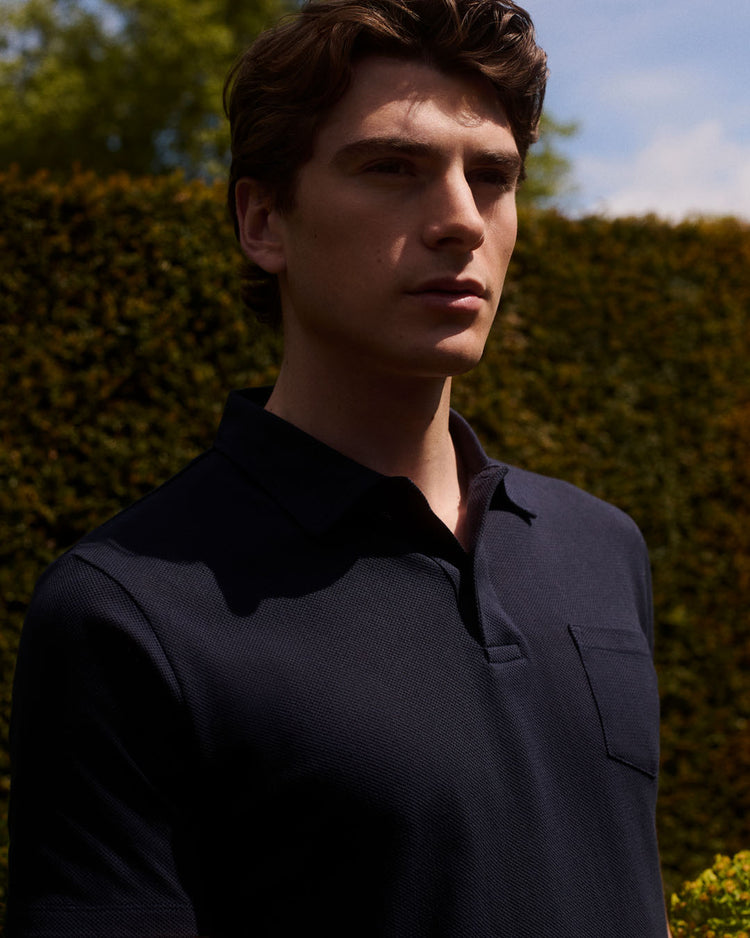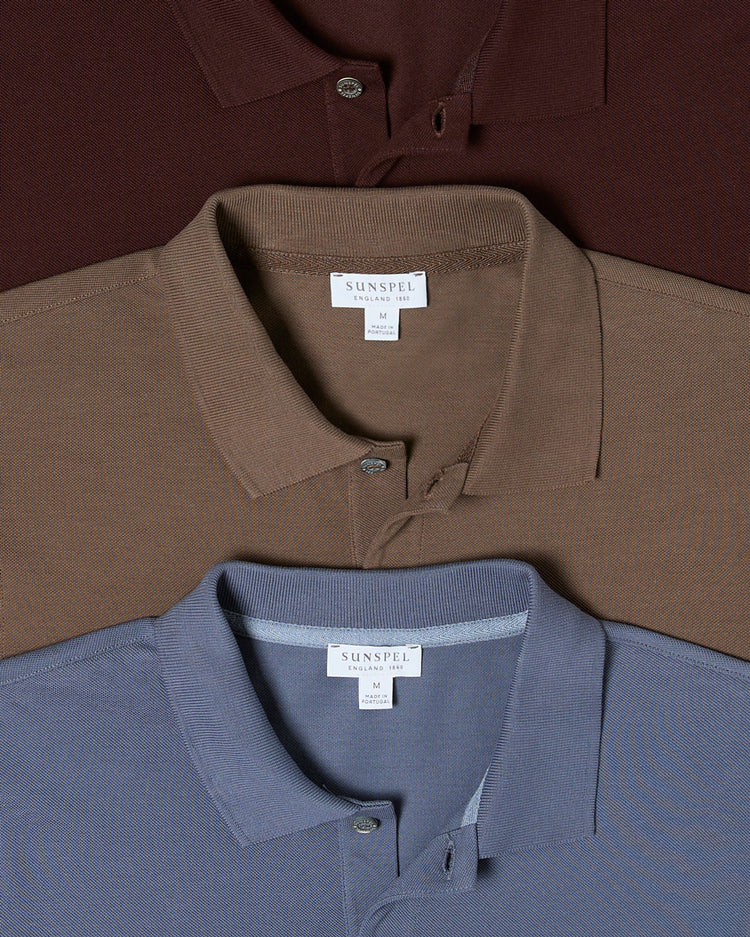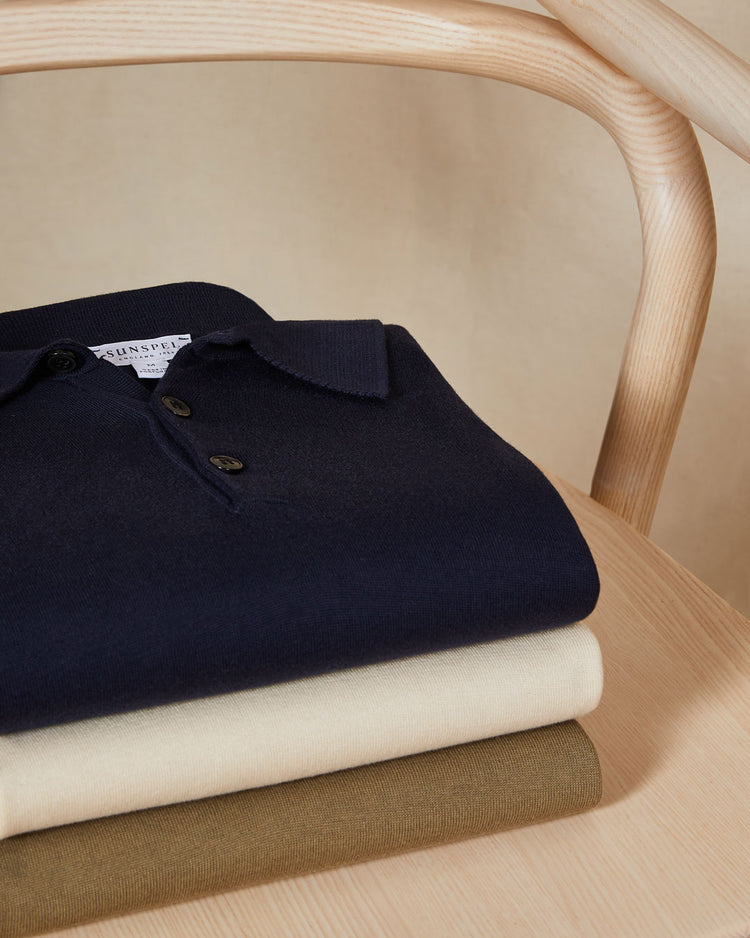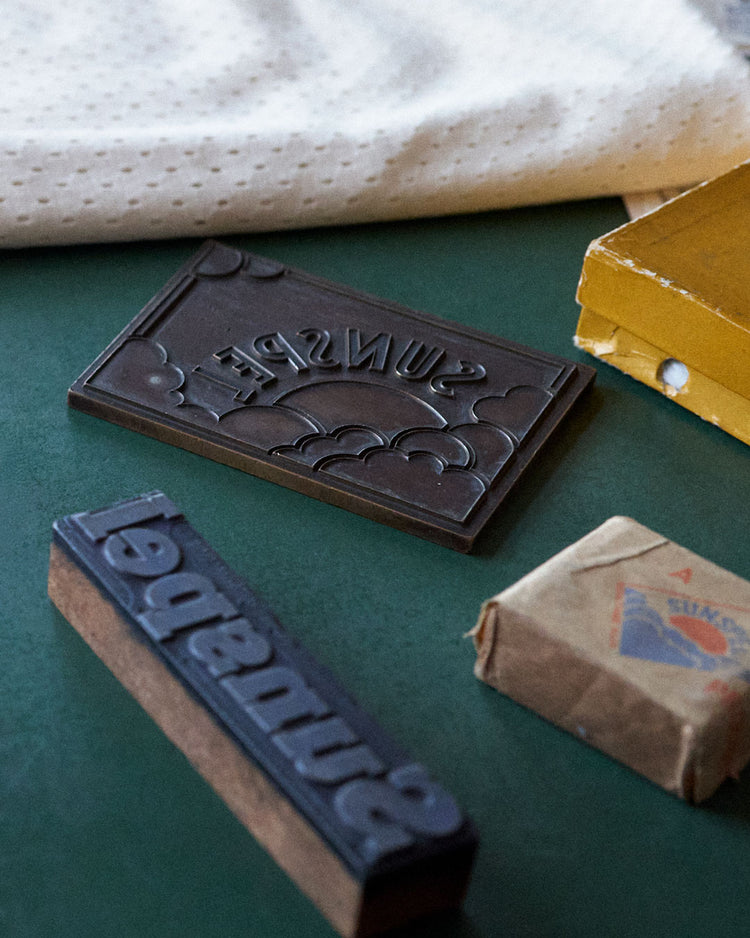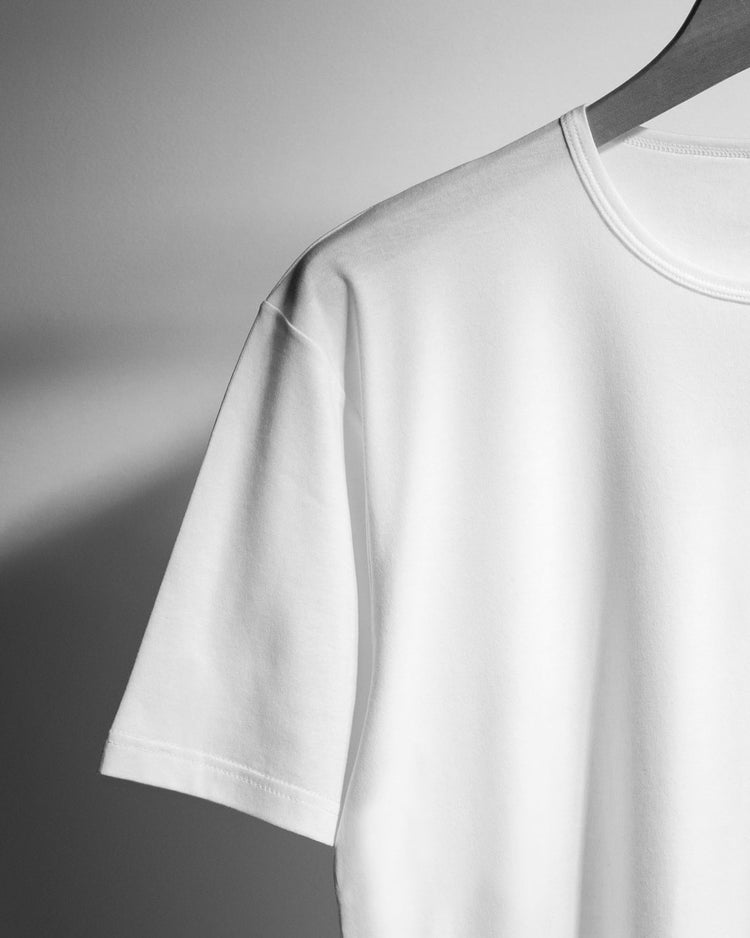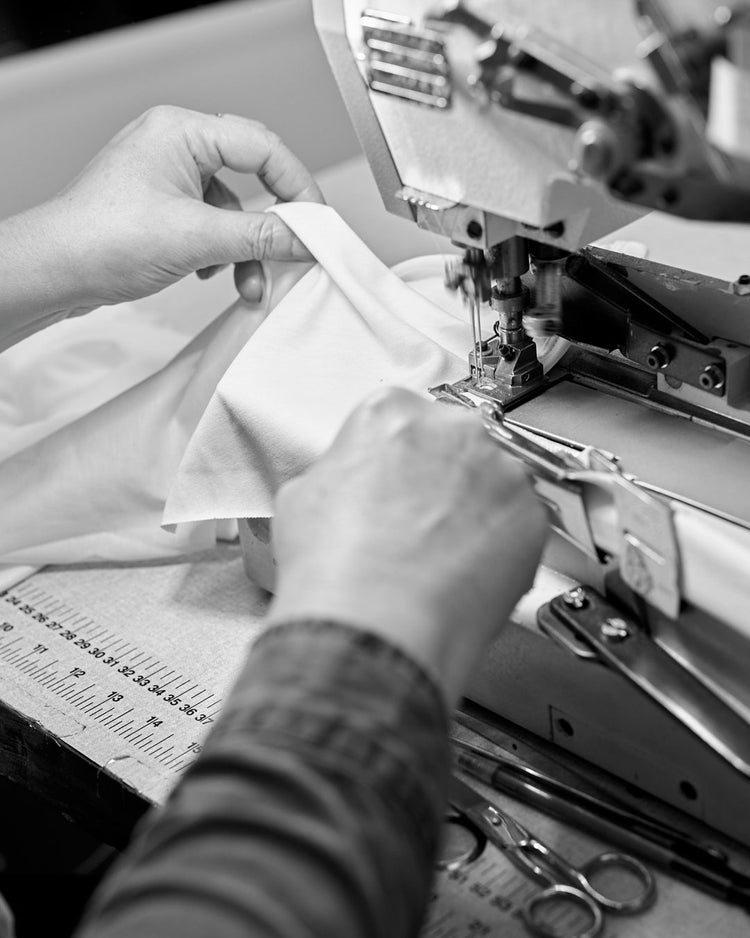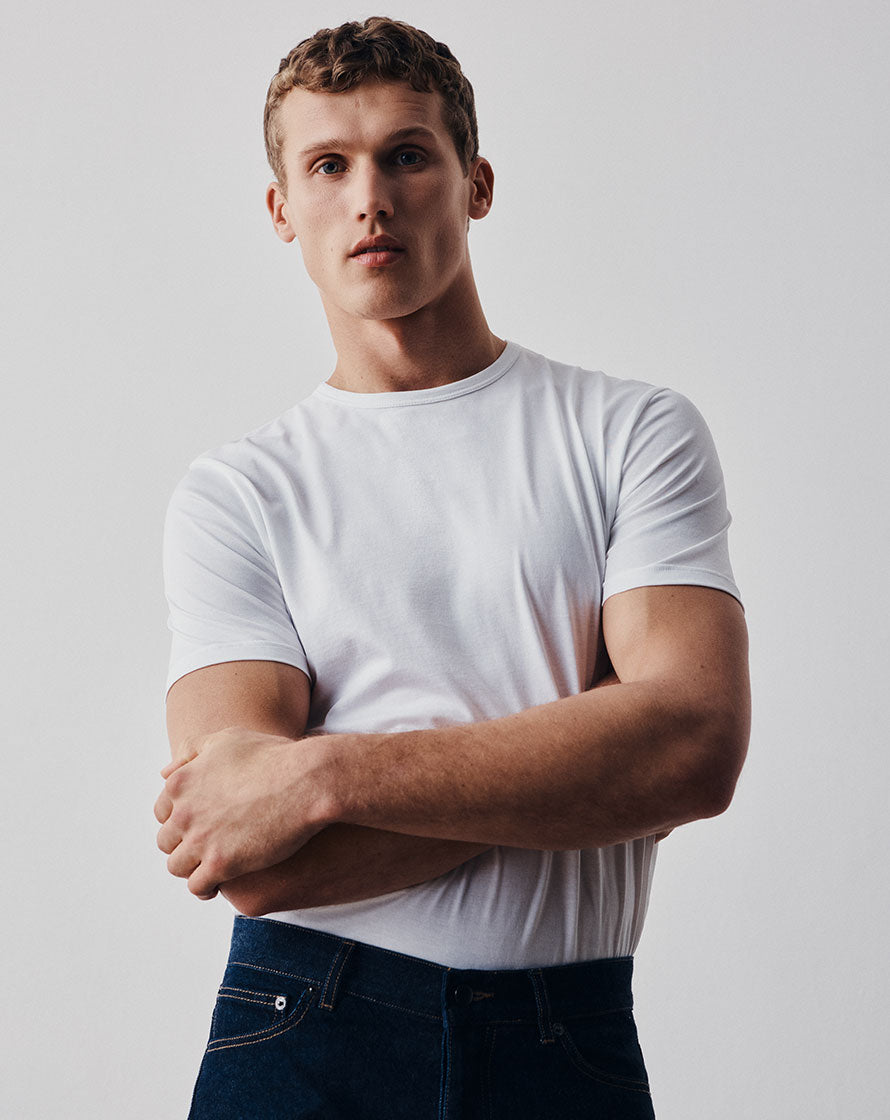Sustainability and Traceability 2023
Table of contents
Foreword
Section 2: Audit and Progress
- 2.1. Materials
- 2.2. Cotton
- 2.2.1. Supima Cotton
- 2.2.2. Sea Island Cotton
- 2.2.3. Other Cotton
- 2.3. Wool
- 2.3.1. Merino Wool
- 2.3.2. Lambswool
- 2.3.3. Cashmere
- 2.3.3. Blue Faced Leicester Wool
- 2.4. Other Materials
- 2.5. Production
- 2.6. Packaging
- 2.7. People and Relationships
- 2.8. Carbon Footprint
Foreword
Much has changed since Sunspel began more than 160 years ago – but what drives our business has not. It can be summed up in a few simple words; do things as well as possible and do the right thing. This is coupled with the principles of an unrelenting commitment to exceptional quality materials, constant improvement and innovation, and the very best craftsmanship. You won’t find these values printed on motivational posters pinned on our office walls or churned out as hashtags for showy marketing campaigns. You will find them woven into the fabric of our business, shaping every decision we make.
Quality applies to every aspect of how we work. It applies to the longevity of our clothing. It applies to our designs, which are timeless and not driven by short-term trends. It applies to our use of natural materials and to our bespoke fabrics, designed to do exactly the right job for each garment. Crucially, quality also applies to our attitude towards people: we treat our employees with respect and care; we build extremely close relationships with our suppliers; and we know the spinners, knitters, weavers, dyers, and makers involved in our supply chain.
We have long believed these values strongly align with a positive relationship with the natural world. Belief alone is not enough however, so we set ourselves the task of thoroughly examining every aspect of our operation to measure our performance against our values. This report sets out the results of that 18-month audit, giving us the clearest possible picture of our efforts and revealing opportunities to improve.
We have established two central principles through this process. Firstly, our definition of a high-quality product must not only relate to the high-quality material but must also include the product’s impact on the world and the workers involved in making it. Secondly, we must maintain the high levels of traceability and control of our supply chain that have been integral to Sunspel since 1860.
By remaining true to our values and ensuring they are shared by everyone we work with, we can continue to build a legacy to be proud of.
1. Overview
1.1. Our History
|
1860 |
Thomas Hill takes over the running of the Nottinghamshire parts of leading British clothing manufacturer I&R Morley, working in partnership with Samuel Morley, a well-known philanthropist, abolitionist, and Liberal Member of Parliament. The business becomes the biggest of its kind in the world with a reputation as a model employer. Messrs Butler & Co is established in the same year.
|
|
1883 |
Thomas Hill joins Messrs Butler & Co and sets out his vision to manufacture the highest quality hosiery and underwear using the world’s finest raw materials knitted into unique fabrics of his own invention, to use the most modern machinery, and to care for his workforce.
|
|
1891 |
Thomas Hill takes complete control of Butler & Co and changes its name to Thomas A Hill.
|
|
1898 |
Thomas A Hill manufactures ladies’ and men’s underwear in the finest cashmere, merino, silk, wool, and cotton, selling its products all over the world. It designs and produces some of the world’s first T-shirts.
|
|
1937 |
The business is renamed Sunspel and relocates to Long Eaton, Derbyshire, where it continues to manufacture today.
|
|
1947 |
Sunspel introduces the Boxer Short to the UK after John Hill (great-grandson of Thomas) takes an American underwear concept and re-engineers it, adding a back panel, flattening the seams, and using the highest quality cotton. The result is a new kind of men’s underwear garment; comfortable, cool, and luxuriously soft.
|
|
2005 |
Nicholas Brooke becomes the new owner and CEO of Sunspel, taking over from Peter Hill, Thomas Hill’s great-grandson, building the brand on the foundation of its existing values.
|
|
2006 |
Sunspel’s iconic Riviera polo shirt and T-shirts are worn by Daniel Craig’s James Bond in Casino Royale.
|
|
Present |
Over the last 15 years, Sunspel has expanded its range beyond its core product categories and developed a retail and online business while retaining its very exclusive wholesale distribution. We continue to manufacture T-shirts at the same Long Eaton factory where we have been since 1937, and partner with best-in-class manufacturers in the UK and Europe who share our values.
|
1.2. Our Approach
Use only natural and renewable materials
More than 95% of the material used in our products comes from natural sources such as cotton and wool, rather than synthetics such as polyester, which come from fossil fuels. We source all our cotton from farms and regions where soil, water, chemicals, and labour are subject to high environmental and social standards.
Control our supply chain and create traceability
We go beyond the minimum standards required by legislation and voluntary frameworks by only working with suppliers with whom we have strong direct relationships. This allows us to reassure ourselves that they share our values on environmental responsibility and the ethical treatment of people.
Design for durability and performance
Our clothing is designed to last. It’s made from the highest quality materials by the best manufacturers. We provide clear care guides and offer repairs for old or damaged products.
Eliminate waste
At every stage of the journey, we take steps to eliminate energy, water and material waste and we work with farms and manufacturers who share this commitment.
Work with nature, not against it
We work with farmers and suppliers who use responsible farming and production processes that prioritise positive environmental outcomes.
1.3. Key Findings
- 95% of our clothing is made from natural fibres.
- 82% of our product is made from cotton.
- 50% of our cotton comes from the USA.
- 42% of our cotton is California Supima that can be traced directly to the farm of origin.
- 100% of our knitted merino wool and lambswool is certified non-mulesed to avoid animal cruelty.
- 100% of our virgin cashmere is farmed nomadically to avoid overgrazing.
- 100% of our clothes are manufactured in Europe.
- 22% of our clothes are manufactured in the UK.
*Data based on our AW22 / SS23 buys
1.4. Recent Actions
While we have concluded from this audit that much of our production is already aligned with our ambitions, we identified areas where we could improve immediately:
We have reduced our use of synthetic materials to focus on natural raw materials. As a result, we are reviewing our active range of polo shirts, T-shirts, trackpants and shorts, which incorporate polyester.
We have increased the number of products we make from Supima cotton and Pima cotton from the USA including our Riviera Polo Shirt and mid-weight Riviera T-shirts.
We have introduced a process for developing new products in which we record each step of their creation from fibre to finished fabric through to manufacturing, to satisfy ourselves that they are created responsibly.
2. Audit and Progress
2.1. Materials
Table 1: Production by Raw Material (% of total production)
|
Raw Material |
% of total production |
|
Cotton Wool Linen Other Natural Synthetic Mixed Fibres5 Other Manmade |
82% 8% 2% 3% 2% 2% 1% |
2.2. Cotton
Table 2: Cotton production by source (%)
|
Source
|
% of total cotton production
|
|
USA (Supima) USA (Pima) USA (other) India Egypt Jamaica (Sea Island) Turkey Mixed Location |
42% 6.2% 1.8% 28.1% 4.9% 3.7% 2.8% 10.5% |
Our Approach
Cotton can be a resource-intensive crop from a land, water, and chemical perspective. Its impact on the environment is often difficult to assess and certification can be opaque.
For Sunspel using the best cotton means that it:
- Has the longest staple length to ensure high quality yarn and fabrics, resulting in finished products that are high performing and long lasting.
- Has the most fibres per bud, so the yield per acre is as high as possible.
- Is fully traceable to its country of origin and where possible to regional and farm level.
- Is grown responsibly: preserving soil quality, using non-toxic and non-polluting chemicals and fair labour practices.
- Is grown using approaches that avoid depleting natural groundwater sources.
2.2.1. Supima Cotton
Supima cotton makes up just 0.5% of global cotton production however, it accounts for more than 81% of our US-sourced cotton. All our Supima cotton can be traced to California and a large proportion comes from a single farm, J.G. Boswell. California has some of the most stringent and detailed agricultural regulations in the world to restrict the use of toxic and polluting chemicals, manage water usage, prevent groundwater deprivation, and ensure fair labour practices.
Supply chain control and traceability
In line with our ambitions for supply chain control and traceability, we are transitioning to source all our California Supima cotton from J.G. Boswell. They have been operating for over 100 years and have developed farming techniques for growing the highest quality crop while minimizing the impact on resources and future harvests. They are able to achieve this as, unlike other suppliers, they have complete control over the entire process; they own the farm, the harvesting, the ginning, and the quality control.
In addition, Supima has partnered with TextileGenesis to establish a new industry platform for authenticating cotton. TextileGenesis’ Fibercoin technology will be integrated into a Supima fibre throughout the supply chain, creating a non-fungible digital token for every kilogram of Supima cotton. Tokens can then be verified and authenticated at every step, from the farm to the store.
Durability and performance
A longer staple length ensures finished products are softer, stronger, and retain colours more effectively. Supima cotton’s staple length is 40% longer than standard long staple cotton, ensuring finished products are higher quality.
Eliminate Waste
100% of the plant is utilised – each cotton plant is made up of 60% seeds, 35% fibre, and 5% waste. The seeds are either used for the next crop or sold to make oil or animal feed, the waste is then used as animal bedding.
Water is managed to minimise wastage. J.G. Boswell use drip irrigation technology to deliver the correct quantity at exactly the right moment in a plant’s development.
Work with nature
Our suppliers at J.G. Boswell continually work to prevent soil erosion and nutrient degradation: they regularly rotate crops to optimise soil nutrient levels, and they use GPS-guided tractors to keep wheels on the same path to avoid disturbing and compacting the soil. They have worked with the California Groundwater Sustainability Agency to create a Groundwater Sustainability Management Plan to protect groundwater in their district. All pesticide use is managed in line with US Environmental Protection Agency regulations and the farm produces regular Pesticide Usage Reports to demonstrate compliance. They are removing environmentally sensitive land from agricultural production and planting species that will improve environmental quality as part of a voluntary conservation programme.
2.2.2. Sea Island Cotton
Sea Island cotton is the rarest in the world, making up just 0.0004% of the world’s cotton crop. It also has the longest staple length of any cotton. Sunspel and Sea Island Cotton are inextricably linked. The name ‘Sunspel’ was inspired by the Sea Island cotton stamp of authentication – a sun rising behind clouds – and we were the first brand to use it to make T-shirts, transforming a utility garment into a luxury one.
Supply chain control and traceability
We source all our Sea Island cotton from the Swiss firm Spoerry, founded in 1866. They have a very similar heritage to our own and their values match ours: commitment to innovation, sustainability, and quality. They maintain their own farms in Jamaica and ensure farming practices and working conditions are of the highest standards. We have full visibility of the spinning, knitting/weaving, and dyeing processes, which take place in Switzerland, Italy and Portugal.
Durability and performance
Sea Island Cotton has the longest staple length of any cotton, leading to finished products that stand the test of time.
Eliminate waste
Spoerry farms use natural irrigation as much as possible, planting the crop in May or June when the rainy season starts. During exceptionally dry seasons when there is little natural rainfall, drip irrigation is used to ensure no water is wasted.
Work with nature
To protect the crop and the outstanding quality of the fibres very few chemicals are used in the farming process. Similarly, ginning is performed on old manual ginning stands and all picking is done by hand.
2.2.3. Other Cotton
We source additional cotton from other areas of the USA, and from Egypt, Turkey, and India. We trace these yarns to the country of origin, to ensure they are not from regions where there is a possibility of labour force abuses or environmental damage.
Table 3: Wool production by type (%)
| Type |
% of total wool production
|
|
Merino Lambswool Cashmere Other |
46.8% 24.5% 14.2% 14.5% |
Our Approach
Wool accounts for 8% of our production. Our merino and lambswool come from South Africa, Argentina, New Zealand and Peru, our cashmere from Mongolia and our Bluefaced Leicester wool from England. Our spinners are in the UK and Italy and adhere to the highest standards, ensuring yarn is sourced from reputable sources that conform to the ethical treatment of animals.
2.3.1. Merino Wool
Merino wool makes up 46.8% of our wool production (3.85% of total production) and has been core to the business since the 1800s.
Supply chain control and traceability
All our merino wool is supplied by Italian mills located in Northern Italy – Biella, Lanerossi Filivivi, Tollegno, and Zegna Baruffa.
Durability and performance
Our merino wool is fine (19.5 micron) and is worsted spun to ensure it is not only very soft but durable and long-lasting too.
Eliminate waste
Our knitting processes are designed to minimise waste, with each panel knitted to shape.
Work with nature
All our merino wool is certified as non-mulesed to prevent animal cruelty.
2.3.2. Lambswool
Lambswool makes up 24.5% of our wool production (2.02% of total production). All our lambswool is Responsible Wool Standard (RWS) certified and can be traced to individual farms.
Supply chain control and traceability
Our lambswool is farmed in South Africa and spun, dyed, and finished by Todd & Duncan of Scotland, one of the UK’s oldest suppliers of high quality lambswool and cashmere.
Durability and performance
Our lambswool is extra fine, super geelong (18.5 micron) ensuring soft and long-lasting garments.
Eliminate waste
3D knitting is used to reduce waste and offcuts. Any grease removed is treated and the lanolin extracted and sold.
Work with nature
All of our lambswool is certified non-mulesed. Todd & Duncan use naturally soft Scottish water in their processes, avoiding the need for synthetic softeners. They draw their water for washing and dyeing from Loch Leven, an internationally important RSPB Nature Reserve. All the water they borrow is cleaned, before being returned to the loch, to protect the brown trout, pink-footed geese and 35,000 wintering birds that live there.
2.3.3. Cashmere
Cashmere represents 1.2% of our overall production, 14.2% of our total wool use. All of our cashmere is supplied by Todd & Duncan, of Scotland. It is certified Capra Hircus Laniger breed and reared using traditional nomadic farming techniques in Inner Mongolia, where legislation has been introduced to prevent desertification and improve the livelihood of herders. Policies have been put in place to limit the total number of animals per household and introduce a system of crop rotation where a field is only used for grazing once every three years.
Supply chain control and traceability
Our cashmere is spun by Todd & Duncan. All their yarn can be traced back to the people who sort and separate the raw fibre – predominantly in Inner Mongolia.
Each cashmere lot comes from many herders as the average size of a herd is only 300 goats and each goat produces less than 300 grams of cashmere on average. Todd & Duncan have the same internal traceability systems as used for their lambswool and can directly trace the fibre to the dehairer. Tracing from the dehairers to the herders has been more difficult due to the number of sub-routes used. However, they are moving towards being Sustainable Fibre Alliance (SFA) certified (the equivalent to Responsible Wool Standard in cashmere). They anticipate that this will happen during the second half of this year. They also expect to be Global Organic Textile Standard (GOTS) certified this year.
Durability and performance
We select the finest cashmere available (15.5 micron) to ensure high-performing and long-lasting products.
Eliminate waste
We use recycled cashmere for a small number of products. For our recycled cashmere, we work with several Italian mills to source yarn created by recycling old cashmere garments that are re-spun with 15% virgin yarn to give them the equivalent strength and durability of pure cashmere.
Cashmere guard hair is separated during the de-haring process and is sold to be used in the manufacturing of rugs, carpets etc.
The fibre is scoured, carded, and combed in plants located mainly in China. During this process most of the grease in the fibre is removed leaving the grease content in the fibre between 0.3% and 1% to assist with the yarn spinning. The grease is treated in effluent plants and disposed of.
Work with nature
Todd & Duncan work in partnership with dehairers who encourage sustainable grazing and herding practices, promote high standards of animal welfare, and protect traditional nomadic farming.
2.3.4. Bluefaced Leicester Wool
We produce a unique luxury jumper from Bluefaced Leicester Wool which is farmed, spun, and knitted in England entirely within 150 miles of our own factory in Long Eaton.
Supply chain control and traceability
The wool is fully traceable to farms in North West England.
Durability and performance
The Bluefaced Leicester Wool is 25 Microns which is the finest of all British wools, which makes it very soft, helps it hold its shape and ensures it will last for generations if well cared for.
Eliminate waste
All waste created in the development process is recycled – the water is cleaned on-site and reused, and the grease from the fleece is carefully separated off and sold into the cosmetics industry for lanolin balms and other beauty products. The kemp and bristly wool are used in fertilisers, and the fluffy by-product of combing is used for stuffing teddy bears or is soaked in resin to make moulded furniture.
Work with nature
The wool is undyed and includes no toxic chemicals. It requires minimal water input.
2.4. Other Material
Linen
Linen accounts for 2% of our production but this proportion is growing. We source all our linen from northern France and Belgium, where a perfect climate and ancient expertise ensure the quality is premium. All operators are OEKO-TEX Standard 100 certified and belong to the European Confederation of Flax and Hemp (CELC).
Leather
Leather accounts for a small percentage of our total production and is found in several products including our shoes, belts, and wallets. The leather for our tennis shoes is sourced from the Italian tannery Faeda, founded in 1956, whose team embrace the 17 UN goals for sustainable development and all their leather is Leather Working Group (LWG) Silver Rated. They are developing new formulas that require less water and energy in their tanning process and they are among the first in the world to be certified for low environmental impact leathers by the Institute of Quality Certification for Leather (ICEC) standard.
In addition, the leather used for our small leather goods is sourced from a German tannery founded in 1899. It is LWG Gold Rated - the highest standard. They have 100% control of their raw materials and complete transparency of their supply chain. In 2017 they invested in a Research and Development centre for sustainability and environmentally friendly production methods.
Silk
Silk accounts for a very small percentage of our total operation yet we nevertheless source the highest quality available. Our supplier was established in 1926 and works directly with Chinese silk farms. All their suppliers are Global Organic Textiles Standard (GOTS) certified, guaranteeing the silk is 100% organic and farmed, processed, and manufactured sustainably. No genetic modification, pesticides, chemicals, or AZO dyes are used in the process and GOTS also ensures the International Labour Organisation’s stringent guidelines are met.
Synthetics
Polyester accounts for just 2% of our collection, and around half of this is recycled polyester. This includes upcycled marine plastic used in our swimming trunks, supplied by SEAQUAL. The SEAQUAL Initiative is a community of individuals, organisations and companies working to clean the oceans and raise awareness about marine litter. They collect marine plastic which is then recycled and transformed into yarn.
We also use recycled polyester in some of our outerwear including as wadding in our winter coats. Our drirelease activewear range and active shorts contain non-recycled polyester, this range is under review.
We use small amounts of elastane (between 1% and 3%) in our jacket and trouser range to provide recovery, give and comfort. Our stretch underwear contains 8% elastane, and our socks can contain up to 20% nylon and a small percentage of elastane.
2.5. Production
Our Approach
We only work with suppliers who share our values and with whom we have longstanding direct relationships. We only work in geographies with strong legal frameworks and enforcement around social welfare, working conditions, and environmental practices. In addition, we conduct our own regular factory visits.
Yarn Spinning
Spinners by geography and production (%)
|
Geography |
Number of Spinners |
% of production |
|
Italy India Turkey Portugal Switzerland Scotland Egypt Spain Japan Peru England Other |
17 4 3 3 1 2 1 1 4 1 3 12 |
30% 24% 10.5% 3.1% 3% 2.4% 2.1% 0.8% 0.6% 0.4% 0.3% 22.8% |
Fabric weaving, knitting, dyeing and finishing
We have always developed our own unique fabrics, for example the Q75 mesh used in our Riviera Polo Shirt and the Q82 jersey used in our Classic T-shirts. We are continually innovating and this innovation is only possible thanks to the depth of our relationship with our fabric producers. In addition, we only work with suppliers based in Europe, who are subject to robust local regulations regarding effluent treatment and many have Registration, Evaluation, Authorisation and restriction of Chemicals (REACH) certification. We ensure that we are compliant with Zero Discharge of Hazardous Chemicals (ZDHC). All of our suppliers are OEKO-TEX Standard 100 certified.
Fabric mills by geography and production (%)
|
Geography |
Number of Mills |
% of production |
|
Portugal Italy England Japan France Czech Republic Scotland Switzerland |
15 13 5 2 1 1 1 1 |
88% 6.96% 1.7% 0.5% 2.5% 0.3% 0.02% 0.02% |
Product manufacturing
We still own our factory in Long Eaton, where our classic T-shirts are manufactured. We work with suppliers in Europe to make our other products.
Manufacturers by geography and production (%)
|
Geography |
Number of Manufacturers |
|
||
|
Portugal England Scotland Italy Spain France Japan |
13 10 5 1 1 1 1 |
77.58% 18.5% 3% 0.5% 0.2% 0.2% 0.02% |
2.6. Packaging
We use Forest Stewardship Council (FSC) Certified and fully recyclable paper for all our online delivery boxes.
All of our underwear boxes and carrier bags are 100% recyclable, and we are transitioning to FSC Certified paper for underwear boxes this year.
The bags we use to protect our clothes during travel are made from polypropylene (PP). While PP can be recycled and is considered one of the safer plastics from a health perspective, effective recycling is limited because of the difficulties involved in collection, contamination, and mixture with other materials. We are currently investigating alternatives to the use of PP bags.
2.7. People and Relationships
Strong relationships are the backbone of Sunspel. We have spent years fostering meaningful personal relationships for every step in a product’s journey and we visit our suppliers and their factories throughout the year.
The fair treatment of people has always been a central value for Sunspel. In our Long Eaton factory, we operate highly flexible working practices and offer employees a four-day week and negotiable hours. The factory does not operate at weekends. Our employees are given comprehensive skill-based training; it takes three months to train someone with existing sewing skills to our standards and six to eight months to train someone from scratch.
During the COVID-19 Pandemic, we supported our community by providing NHS nurses with clothing bags for uniforms and supplying masks for schools and local charities.
2.8. Carbon Footprint
To ensure we are taking meaningful steps towards decarbonisation, we are drawing inspiration from the recommendations of the World Resource Institute (WRI) and Apparel Impact Institute (aii), set out in their report Roadmap to Net Zero: Delivering Science-Based Targets in the Apparel Sector. This report outlines six decarbonisation levers for the apparel and footwear industry, which are detailed below:
- Maximizing material efficiency. Using design, material selection, and methods of manufacturing, to reduce the amount of fibre and materials that go to waste in each stage of production.
- Scaling sustainable materials and practices. Increase the use of more sustainable and durable materials and practices.
- Accelerating the development of innovative materials. Ramp up testing and scaling of next generation materials, including textile recycling, and bio-engineered materials.
- Maximising energy efficiency. Expand energy efficiency efforts across manufacturing facilities.
- Eliminating coal in manufacturing. Replace coal as a thermal energy source for materials and product manufacturing.
- Shifting to 100 per cent renewable electricity. Deploy renewable electricity across the supply chain.
Carbon Footprint Status vs Decarbonisation Levers
|
Lever |
Current Status |
Future Actions |
|
Maximising material efficiency |
Design focuses on timeless styles to avoid obsolescence.
|
Continue to monitor and evaluate solutions for offcuts with suppliers.
|
|
Scaling sustainable materials and practices |
|
|
|
Accelerating the development of innovative materials |
|
|
|
Maximising energy efficiency |
|
|
|
|
|
|
Conclusion
In this report we have been as open and factual as possible and have made no unsubstantiated claims.
This is because we believe sustainability should be the outcome of thoughtful design and decision-making.
Sunspel was founded 160 years ago on core values: we use exceptional quality natural materials, we work with the best craftspeople, we make clothes that last and we are always looking to improve and innovate.
These are sustainable values and they have always been integral to every part of the business.
As this report has shown, we have a deep understanding of our products, materials, and supply chains. We have knowledge of the farm that supplies our Supima cotton and traceability for our other materials, spinners, knitters, weavers, and dyers. We have strong partnerships with all the manufacturers who craft our final products, every one of which is exceptionally well made and designed to last.
Whilst we appreciate there are still gaps in our knowledge and data, we are in an excellent position for improvement and we will use this report to drive that improvement. We will be updating the report at the end of 2025 to set out how we have made further progress.
CASE STUDY 1
The Classic T-shirt
The journey to create the Sunspel Classic T-shirt begins with Supima cotton, grown on the farms of the 100-year-old family business J.G. Boswell. Crops are rotated to protect the soil and drip irrigation delivers exactly the water needed at the right moment in a plant’s development. Specialist spinners in India and knitters in Portugal then work to create the Q82 fabric our T-shirts are renowned for. This unique fine jersey cotton is directly descended from the pioneering fabric that Sunspel owner Thomas Hill invented in the late 1800s to make some the world’s earliest luxury T-shirts – soft, lightweight, durable, and able to retain its shape through multiple washes.
We still make our Classic T-shirts at our factory in Long Eaton, Derbyshire, our home since 1937. The staff at Long Eaton are integral to our business, as is the local community. Our approach to production is craft-based with a focus on quality, not quantity. The fabric we use is so light that it requires slow, careful work which cannot be rushed. We employ 30 people in our Long Eaton factory and produce approximately 2,000 T-shirts per week. There are 12 processes involved in the making of a Sunspel Classic T-shirt, with 15 recorded quality control checks along the way. A specialist skilled worker ensures every step is performed to perfection, from the fabric cutting to stitching, pressing, and folding. Quality control is a process that is managed by each individual worker and enhanced through roving quality control checks and a final rigorous examination.
So much is invested in our fabric that we do not waste it. We aim to order the exact amount of fabric needed for production. Any excess fabric is stored for the future and if still unused we offer it to university design courses and local schools. Any pieces that fail our quality checks are donated to charity or sent to our factory shop. We are investigating options for recycling any remaining waste fabric either back into fabric or into paper. We are also investigating how we can reduce waste fabric by recycling offcuts generated during the cutting process.
CASE STUDY 2
The Luxury British Jumper
Since 2022, we have collaborated with some of the finest craftspeople and specialists in Britain to create the Luxury British Jumper. We are proud to say this garment has been entirely farmed, scoured, spun, and knitted in Britain. In fact, the whole process, from farm to finished product, takes place within 150 miles of our factory in Long Eaton.
The journey begins in the hills of Lancashire, Northumberland, and Yorkshire, where the Bluefaced Leicester sheep are reared. British wool is usually very rough and harsh against the skin however, the Bluefaced Leicester’s fleece has an unusually long staple and the finest micron count of the British wool clip. This makes for an incredibly smooth yarn and a fine, silky drape which means it is some of the most sought-after in the country.
Today, very few garment wools are sourced in Britain. Most come from the southern hemisphere, incurring a significant carbon footprint, and neglecting the rich heritage of British wool. Working closely with sustainable wool specialists Upland Yarns, we ensure our yarn is produced with extraordinary care and using no toxic chemicals during processing – which is extremely rare.
The raw fleece travels to Bradford to be made into fibres ready for knitting. Before carding and combing, the fleece is washed with organic detergent to draw out its protective oils. To reduce waste, these are sent to be used in balms and cosmetics. For this jumper, we preserve the wool’s natural tones, meaning the colour is created organically during the spinning process. This stage takes place at Laxtons mill in Bradford, one of the oldest spinners in the country. The knitting stage then takes place in Leicester using a unique pattern from our archive.
CASE STUDY 3
Riviera Polo Shirt
The Riviera Polo Shirt came off the Sunspel design table almost seven decades ago and it embodies Sunspel’s commitment to the best materials, innovation, and craftsmanship.
Frustrated by the coarse, itchy and uncomfortable piqué cotton polo shirts of the 1950s, Peter Hill, grandson of Sunspel’s founder Thomas, identified a need for change. His solution was to recalibrate Sunspel’s warp knit lacemaking machines to create a lightweight open knit cotton fabric with a soft, breathable mesh structure, which we call Q75.
While its history dates back 70 years, we have continually improved the Riviera Polo Shirt to ensure it is always the highest quality possible. Recently, we have developed the cotton we use to be Supima cotton. This is an extra-long staple cotton resulting in a garment that is not only very comfortable but also exceptionally durable too. We can trace all our Supima cotton to the Californian farm it comes from so we know the labour force is treated fairly and that the farming methods used are environmentally responsible. The cotton is spun in Italy by a luxury mill, Futura Filati and then it is knitted and manufactured by our partners in Portugal.
We are proud that our iconic Riviera Polo Shirt is fully traceable right through every stage of production all the way back to the farm where the cotton is grown. As a result, we know that the final product is ethically made, exceptionally high quality and will last for many years to come. The same is true for every one of our products.
